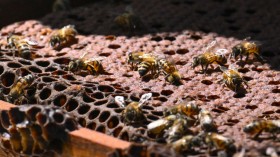A six-year-old boy was fishing with his family off Rock Harbor in Cape Cod Bay when he suddenly hooked in one of the ocean's most feared predators.
According to reports, Blake White was holding on to his fiberglass fishing rod, casually waiting to catch a striped bass, when he felt a strong tug. The young boy alerted his father, Lars, who immediately took over the reeling.
"My brother thought it was, he thought it was a submarine," Blake told CBS Boston. "It felt super strong."
Lars told CBS that their catch struggled for more than an hour, trying to free itself from the hook but was unsuccessful in doing so.
Once it came to the surface, they saw the big fish with pierced pectoral fins. The mother of the boy immediately took photos of it before cutting the line and setting it free.
"There was no way we were going to be able to get it on board. So the only thing we could do was get it alongside the boat, take some pictures and let it go," Lars said in a separate interview with The Telegraph.
The photos were sent to the Atlantic Great White Shark Conservancy. State shark scientist Gregory Skomal confirmed it was indeed a great white shark.
Lars said the incident is definitely a beginner's luck, especially because sharks do not usually lurk in that area.
According to Cape Cod Times,the shark, which they caught about 1:15 p.m., is estimated to be 10 to 12 feet long.
Associated Press reported that great white sharks have been spotted in increasing numbers in recent years around Cape Cod. But there have been no reports of anyone reeling in a great white in the area.
Over years of research, the image of the great white shark being a ruthless predator is starting to disappear. Scientists have found out that they are actually inquisitive creatures who bite out of curiosity and not merely to victimize.
National Geographic said the great white sharks are found in cool, coastal waters all over the world. They grow to an average of 15 feet in length, though specimens exceeding 20 feet and weighing up to 2,268 kilograms have been recorded.
© 2024 NatureWorldNews.com All rights reserved. Do not reproduce without permission.





